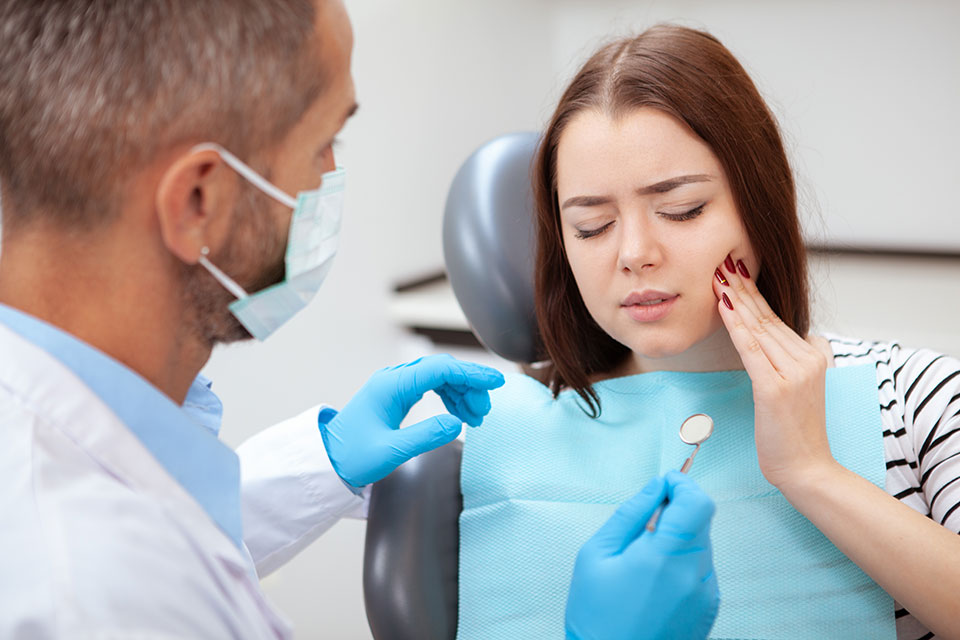Periodontal Maintenance with Dr. Gropp
Periodontal maintenance is an important part of oral healthcare for those who have experienced gum disease. This professional dental cleaning is specifically designed to prevent the progression of periodontal disease, remove harmful bacteria, plaque, and tartar, and help maintain the health of your gums and teeth. For individuals who have already undergone periodontal therapy, regular maintenance cleanings every three to four months are crucial to avoid further complications and ensure long-term oral health.
Understanding the role of periodontal maintenance is vital for those at risk of or recovering from gum disease. Not only does it help preserve the structural integrity of your teeth, but it also prevents tooth loss, supports gum health, and may even reveal early signs of other health conditions.
In this guide, we’ll explore the importance of periodontal maintenance, its benefits, and how it fits into your overall gum disease treatment plan. If you’re dealing with periodontal disease or simply looking to maintain your gum health, please reach out to our Northridge, CA, dentist by calling (818) 709-8645. We also proudly serve patients coming from Canoga Park, Reseda, Chatsworth, and the surrounding areas.
What Is Periodontal Maintenance?
Periodontal maintenance is a professional dental cleaning designed to remove the bacteria, plaque, and tartar buildup that can cause or worsen periodontal disease. It’s an essential treatment for people who have already undergone periodontal therapy and have a history of gum disease. Periodontal maintenance is a crucial part of gum disease treatment, fitting into the overall plan to manage and prevent the progression of the condition.
Periodontal maintenance appointments are typically scheduled every three to four months, depending on the patient’s condition and the recommendation of their dentist or periodontist.

Understanding Periodontal Disease
Periodontal disease, commonly known as gum disease, is a chronic bacterial infection that affects the tissues surrounding the teeth, including the gums, periodontal ligament, and bone. This condition is a leading cause of tooth loss in adults and can have serious consequences if left untreated. Periodontal disease is characterized by inflammation and infection of the gums, which can lead to the destruction of the supporting tissues around the teeth. Understanding the nature of this disease is crucial for maintaining good oral health and preventing further complications.
Signs and Symptoms of Periodontal Disease
The signs and symptoms of periodontal disease can vary depending on the severity of the condition. Common symptoms include:
- Bleeding gums, especially during brushing or flossing
- Loose or sensitive teeth
- Red, swollen, or tender gums
- Bad breath or a bad taste in the mouth
- Changes in the way teeth fit together when biting down
- Pus or discharge between the teeth and gums
If you are experiencing any of these symptoms, it is essential to visit a dentist or periodontist for a proper diagnosis and treatment. Early detection and intervention can help manage the disease and prevent further damage to your oral health.
Risk Factors and Causes of Periodontal Disease
Several risk factors and causes can contribute to the development of periodontal disease. These include:
- Poor oral hygiene: Not brushing and flossing regularly can lead to the accumulation of plaque and tartar, which can cause gum disease.
- Genetics: Some people may be more prone to developing periodontal disease due to their genetic makeup.
- Smoking: Smoking is a significant risk factor for periodontal disease, as it can reduce blood flow to the gums and make them more susceptible to infection.
- Diabetes: People with diabetes are more likely to develop periodontal disease, as high blood sugar levels can affect the body’s ability to fight infection.
- Hormonal changes: Hormonal fluctuations during pregnancy, menstruation, or menopause can affect the gums and increase the risk of periodontal disease.
Understanding these risk factors can help you take proactive steps to prevent gum disease and maintain healthy gums. Regular dental check-ups and good oral hygiene practices are essential in managing these risk factors.
The Benefits of Periodontal Maintenance
There are many benefits to periodontal maintenance, including:
- Prevents periodontal disease from progressing: This type of dental cleaning helps remove bacteria and plaque buildup, preventing periodontal disease from worsening.
- Prevents tooth loss: Gum disease is the leading cause of tooth loss in adults. Regular periodontal cleaning appointments can help prevent this from happening.
- Maintains oral health: Periodontal maintenance helps keep your teeth and gums healthy and can prevent other oral health problems, such as cavities and bad breath. Brushing twice a day with fluoride toothpaste is also essential to effectively remove plaque and combat the bacteria that cause gum disease.
- Helps detect other health problems: Your dentist or periodontist may be able to detect other health problems during your periodontal cleaning appointments, such as diabetes or heart disease.
Who Needs Periodontal Maintenance?
Anyone who has had periodontal disease in the past and has undergone periodontal therapy is a candidate for periodontal maintenance. Additionally, you may also benefit from this type of dental cleaning if you:
- Have a family history of gum disease
- Smoke
- Have diabetes
- Are pregnant and may be at a higher risk for gum disease
To schedule an appointment with our Northridge dentist, contact our office at 818-709-8645 .
The Periodontal Maintenance Process
The periodontal maintenance process typically involves a thorough cleaning of the teeth and gums. Here’s what you can expect:
- Evaluation: Our dentist will evaluate your gum health and determine if further treatment is needed. In some advanced cases, bone grafting may be necessary to support the teeth and promote natural bone regeneration.
- Scaling and Root Planing: If necessary, our dental hygienist will perform scaling and root planing, also known as a deep cleaning, which involves removing plaque and tartar buildup from the teeth and smoothing out the tooth roots to prevent bacteria from sticking to them.
- Polishing: After scaling and root planing, our dental hygienist will polish your teeth to remove any remaining stains or plaque.
- Oral Hygiene Education: Our dental hygienist will provide oral hygiene education and tips to help you maintain good oral health at home.
- Follow-up: The dentist will schedule your next appointment for periodontal maintenance, typically three to four months later.
The Cost of Periodontal Maintenance Cleanings in Northridge, CA
On average, periodontal maintenance appointments can cost between $150 to $300. The cost will vary depending on the location, the experience of the dentist or periodontist, and your insurance coverage. In general, it’s more expensive than a regular dental cleaning, but most dental insurance plans cover all or a portion of the costs. Patients should check with their insurance provider to confirm coverage and out-of-pocket costs. Ask your dentist if they have any special discounts or provide financing options.
Here are some tips for saving money on periodontal maintenance cleanings:
- Ask your dentist about their payment plans. Some dentists offer discounts for paying in full or for setting up a payment plan.
- Look for a dental school or clinic in your area. Dental schools often offer discounted dental care under the supervision of experienced dentists.
- Check with your insurance company to see if they offer any coverage for periodontal maintenance.
- Compare prices between different dentists in your area.
How to Maintain Healthy Gums and Prevent Bleeding Gums at Home
To help keep periodontal disease from recurring, our Northridge dentist has provided tips on how to maintain healthy gums at home:
- Brush and floss teeth regularly. Maintaining good oral hygiene can help prevent bone loss, which is a critical aspect of periodontal disease.
- Use mouthwash
- Quit smoking
- Eat a healthy, balanced diet
- Stay hydrated
- Keep up with a routine dental cleaning schedule
Finding a Periodontist

If you have been diagnosed with periodontal disease, it is essential to find a qualified periodontist to provide treatment. Here are some tips to help you find a periodontist:
- Ask for referrals: Ask your dentist or other healthcare professionals for recommendations.
- Check online directories: Look for periodontists in your area through online directories such as the American Academy of Periodontology (AAP) or the American Dental Association (ADA).
- Check credentials: Make sure the periodontist is licensed and certified by the AAP or ADA.
- Check experience: Look for a periodontist with experience in treating periodontal disease.
- Check reviews: Read online reviews from other patients to get an idea of the periodontist’s reputation and quality of care.
By following these tips, you can find a qualified periodontist to help you manage and treat periodontal disease effectively. Taking the time to find the right specialist can make a significant difference in your oral health and overall well-being.
Frequently Asked Questions
How often do I need periodontal maintenance?
Periodontal maintenance appointments are typically scheduled every three to four months, depending on the recommendation of your dentist or periodontist and your individual needs.
Is periodontal maintenance painful?
Periodontal maintenance isn’t usually painful. Some patients may experience mild discomfort during the cleaning process. Your dental hygienist can use numbing agents or adjust the cleaning technique to make you more comfortable.
Can periodontal maintenance cure gum disease?
Periodontal maintenance isn’t a cure for periodontal gum disease, an infection affecting the tissues that support teeth. While it helps manage and control the progression of the disease, it does not cure it. Consistent and proper oral hygiene habits, along with regular periodontal maintenance appointments, can help keep periodontal disease under control.
Protect Your Gums With Periodontal Maintenance
Periodontal maintenance is a critical preventive treatment that can help patients manage and control the progression of periodontal disease. You should schedule a periodontal maintenance appointment if you have a history of gum disease or are at risk for developing gum disease. Periodontal maintenance helps preserve healthy gum tissue, which is essential for overall oral health. Dr. Gropp is willing to help you get the dental care you need.
Contact our Northridge, CA, dental office today to get your appointment scheduled. We also proudly serve patients coming from Canoga Park, Reseda, Chatsworth, and the surrounding areas.

